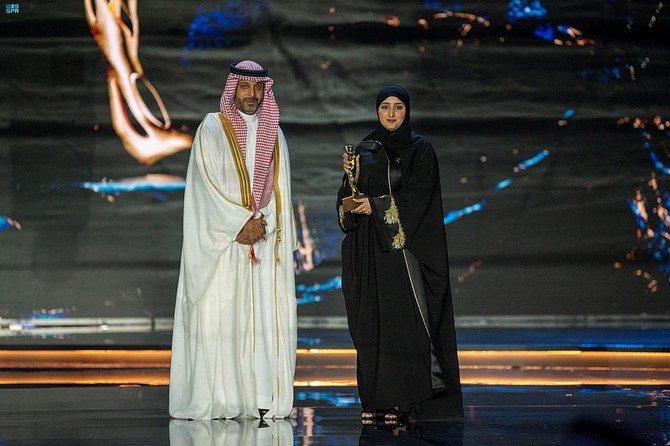
- ARAB NEWS
- 19 Apr 2024

Hebshi Alshammari
RIYADH: Dr. Abdulaziz bin Mohammed Alsubayel, chairman of the board of trustees of the King Abdulaziz Center for National Dialogue and secretary general of the King Faisal International Prize, has won the cultural pioneer award during the Ministry of Culture’s second session of the “National Cultural Awards.”
He received the prize in recognition of his distinguished literary and cultural career, as well as his roles in cultural administration, where he held a number of leadership and academic positions while serving Saudi culture, intellectuals and literature.
The event was held under the patronage of Saudi Crown Prince Mohammed bin Salman.
A global prize, called the “international cultural excellence award,” will be launched in the next session of the event, organizers announced. The award will recognize and celebrate global and regional cultural personalities and institutions that enrich the cultural landscape, and reaffirms the Kingdom’s determination to open new avenues for cultural creativity and expression and encourage cultural dialogue with the world.
Meet the winners of this year’s #NationalCulturalAwards, who have each made outstanding contributions to the Kingdom's cultural sector.
— Saudi Arabia Ministry of Culture (@mocsaudi_en) September 9, 2022
Congratulations to you all! 🏆#SaudiMinistryOfCulture pic.twitter.com/jWUweSJsxz
Deputy Culture Minister Hamed bin Mohammed Fayez said in a speech delivered on behalf of Saudi Minister of Culture Prince Badr bin Abdullah bin Farhan: “I am delighted to welcome you to the Capital of Culture, the Beacon of Knowledge, and the Oasis of Art in a cultural event in which we celebrate the creative personalities, with the support of the Custodian of the Two Holy Mosques and the patronage of His Highness the Crown Prince, who is supportive of our culture and the champion supporter of it.
“The historical depth and civilization of our homeland and the creativity of our people have put the Kingdom in an advanced cultural place, which enabled the Ministry of Culture to highlight our creative treasures as per the Vision 2030,” he said.
Fayez said: “The National Cultural Awards initiative was an inspiration for creators and an essential pillar for further advancement of cultural and cognitive development.”
Cultural sector award recipients were also recognized.
Badr Al-Hamoud, a writer and filmmaker, received the “youth cultural” award for his efforts in the film industry, publishing initiatives, translation and technical projects. He founded the Center Menaverse for Innovation and Development, the world’s first center to interactively disseminate cultural products, and has established a platform called “Meaning” to spread knowledge, artistic and philosophical content. He managed the translation projects of 30 books in philosophy and humanities.
Just announced! 📣
— Saudi Arabia Ministry of Culture (@mocsaudi_en) September 9, 2022
The 2023 #NationalCulturalAwards will include a new international category to celebrate the achievements of global cultural pioneers, reaffirming our commitment to cultural exchange between #SaudiArabia and the world. #SaudiMinistryOfCulture https://t.co/scWdqW1MC0
Kifah Bu Ali won first place in the literature prize while Jarir Bookstore won the publishing award. Shareef Bogona, a translator and poet, won the translation award while Samira Alotaibi won the fashion award. Ahmed Alneghaither, a researcher in drawings and engravings, won the national heritage award and Abdulsamad Alhawsawi won the culinary art award.
Artist Muhannad Shonu won the visual arts award while Ali Khobrani won the theater and performing arts award. Bandar Bin-Obaid won the music award while Faisal Battoyoor won the film award and Muhammed Shafea won the architecture and design award.
The Diriyah Gate Development Authority won the cultural institutions award in the state sector while the Misk Institute of Art won the cultural institutions award in the non-profit sector. The Music Home School of Art won the cultural institutions award in the private sector.
Ahmed Qirran Al-Zahrani, deputy dean of communications and information for graduate studies and academic research at King Abdulaziz University, told Arab News that nations founded on cultural legacy were able to elevate their homelands to the forefront of the cultural landscape around the world.
Cultural symbols deserved to be honored and acknowledged for their contributions to the nation, as well as to preserve cultural memory and encourage future generations to follow in their footsteps, he said.
Al-Zahrani said that the Ministry of Culture had a significant obligation to revitalize heritage, assist the cultural movement and financially and morally encourage intellectuals.
The cultural movement was evident in domestic cultural activities such as organizing book fairs, holding cultural festivals, holding conferences, supporting cultural institutions, honoring intellectuals, participating in outdoor cultural events and supporting intellectuals individually participating in festivals, meetings and outdoor exhibitions to represent and communicate local culture beyond geographical boundaries.
Abdulaziz Al-Kheshaiban, chairman of the board of the Media and Public Relations Society in Onaizah, said that recognizing local cultural symbols was connected with recognizing cultural pioneers, creators and achievers.
He said that the cultural movement was witnessing a diversity of platforms, and that official literary clubs, private literary meeting places and cultural cafes were the most important of these.
Al-Kheshaiban said that education and knowledge were important in the evolution and progress of cultures.